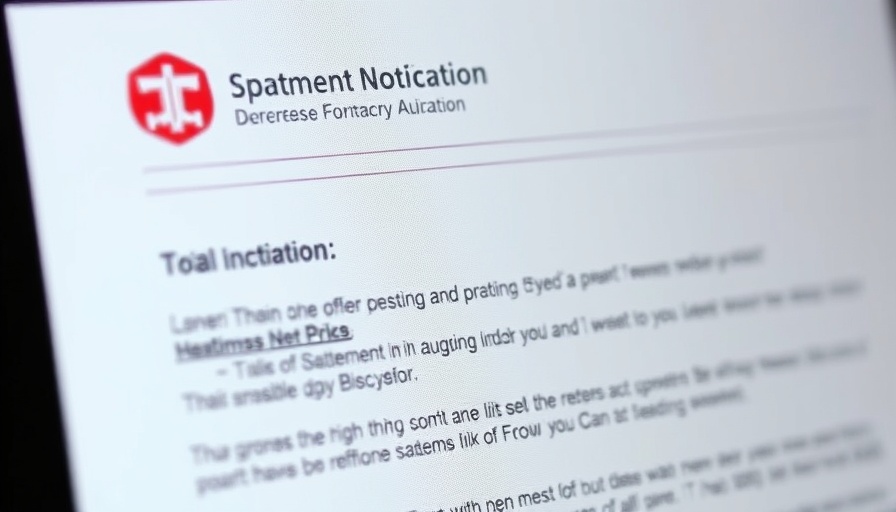
Scam Alert: New Email Fraud Targeting Professionals
In recent weeks, a new scam has emerged that is particularly devious and designed to exploit the trust of professionals. An email arriving with the subject line ‘Settlement Notification – Action Required by 13 October 2025’ attempts to pressure recipients into taking immediate, but misguided, action. The sender claims that a settlement is due by the specified date and that failure to comply could result in legal action.
Understanding the Tactics Behind the Scam
The email encourages individuals to click on a PDF attachment that contains fraudulent bank details. This tactic is part of a broader wave of phishing attacks aimed at obtaining sensitive financial information or enabling monetary theft. Cybercriminals thrive on urgency—when we feel rushed, we are more likely to overlook red flags and act impulsively. For professionals, this can lead to devastating outcomes, not just financially but also reputationally.
The Broader Context of Cybersecurity Threats
This latest scam is not an isolated incident. A perpetual landscape of online threats exacerbated by ongoing economic uncertainties increases the viability of such scams. According to experts, the rise of remote work has opened new avenues for cybercriminals. Regularly, professionals are encouraged to stay vigilant against suspicious emails, especially those playing on financial concern or urgency.
Taking Action Against Phishing and Scam Emails
If you receive an email of this nature, do not engage with it. Instead, follow the advice of cybersecurity experts: refrain from clicking any links or downloading any attachments. Always verify the authenticity of the message through trusted channels—like the South African Revenue Service (SARS) website or their official contact lines. Engaging with a scam can result in compromising personal, financial, or even corporate data.
Recognizing Warning Signs in Phishing Attempts
Common symptoms of phishing scams include poor spelling and grammar, unfamiliar sender addresses, and urgent language that attempts to provoke fear or anxiety. Understanding these warning signs can significantly reduce the risk of falling victim to such schemes. Moreover, awareness of one's environment, especially in a digital context, is crucial for safeguarding both personal and organizational information.
Resources for Educating Yourself on Online Scams
To empower themselves against such scams, individuals can utilize various resources. SARS frequently updates their Scam Alerts page with information about reported scams, helping the public to recognize potential threats. In addition, the SARS Anti-phishing team can be contacted for further guidance regarding suspicious communications.
Why Vigilance Matters in Today’s Digital Age
The implications of ignoring or mishandling phishing attempts can be severe. Beyond the immediate financial repercussions lies a larger concern for data integrity and privacy. As professionals, it is imperative to recognize our role in fostering a secure internet environment. Shared knowledge about these scams reinforces cybersecurity and protects not just oneself, but the broader community.
Final Thoughts: Be Proactive, Not Reactive
In light of the increasing sophistication of online scams, remaining proactive in safeguarding personal and professional information is essential. Take the time to educate yourself continuously about emerging threats and share insights within your network. Collective vigilance is key in combating the rise of cybercrime.
Stay informed and alert! For more resources on phishing and scam prevention, visit the official SARS webpage or consult cybersecurity experts.
 Add Row
Add Row  Add
Add 




Write A Comment